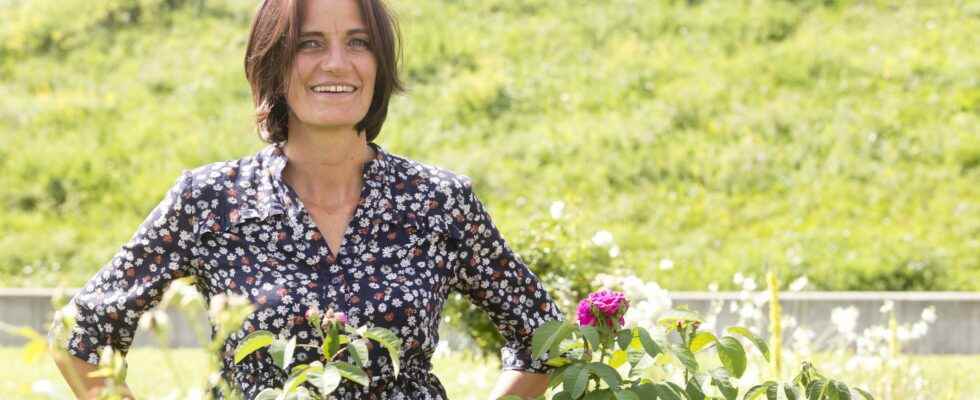In his series “I was happy here”, Robert Schneider accompanies Vorarlbergers to their favorite places from their childhood. A few days ago he met the Montessori teacher Evi Hagen in Lustenau.
The Neubaustrasse in Lustenau is a narrow residential street – more path than street – that runs dead straight along the steep Rhine embankment. On the embankment, the tracks of the Rheinbähnle slumbers its slumber – the former goods railway of the Rhine regulation. Grass grows between the sleepers, the first autumn flowers. “When we were children, we often jumped onto the freight wagons because the trains were so slow. Of course that was strictly forbidden,” says Evi Hagen, who I meet in the garden of her parents’ house. Mom is there too, bringing coffee and chocolate biscuits, which immediately melt in the sun. I can’t clean them up that quickly. “I’d rather put them back in the fridge,” says Mom. She is the generation that still knew deprivation, was not allowed to live out their wishes – unlike us, who grew up long after the war. Evi Hagen is a traditional elementary school teacher at the elementary school in Kirchdorf, but from the beginning of her training she has been intensively involved with reform pedagogical school concepts according to Maria Montessori. Robert Schneider: There are four girls in the family. Wasn’t there a boy missing? Evi Hagen: There were only girls on the whole street. Yes, there was a boy…Schneider: …who was definitely the cock of the basket? Hagen: I don’t remember that anymore. Anyway, I grew up surrounded by girls. But we also made the area unsafe here, spent a lot of time on the banks of the Rhine, although we children were not allowed to climb over the dam. Mum sighs and interjects: “I just always lacked the basic trust. Only when the girls were grown up did they confess to me: Mom, you don’t even know how often we’ve been to the Rhine!”Schneider: Evi, do you have basic trust? Hagen: Totally.Schneider: When is the Rhine most interesting? But at high tide, right? Hagen: Not at all. I liked it much better when it held little water. Then there was a dark sand on the shore with lots of stones and grassy islands. We played on these grassy islands. Once we noticed too late that the water was suddenly rising and we couldn’t get back to shore dry-shod.Schneider: What was the impetus for you to decide on alternative learning concepts? Hagen: I don’t know if the name Mauricio Wild meant anything to you says. He was co-founder of the learning environment “Pesta” in Ecuador, founded a school there that I consider to be the greatest ever. His concept was teaching without directivity, i.e. external determination. I met him at an intensive seminar in Arbogast and then just cried for three days. Because I recognized that we are exclusively determined by others and in reality we don’t act ourselves, but that everything is still laid out in the child.Schneider: For me as a layman: What is the essence of the Montessori concept? Hagen: First of all, a very important part is the vintage mix. There are so-called family classes. Several grades in one class. It is basically the image of society on a small scale. The younger children learn from the older ones, but also vice versa. The teacher’s role is more that of companion and observer. The learning material is also different, without going into more depth now. Basically, it’s about going from holistic to detail, not the other way around. In other words: give the children the world in their hands, where they can then discover the details.Schneider: We are at the beginning of a new school year. My boys complain that they have to go back to school. Shouldn’t it be the other way around? Hagen: I can reassure you there. We also have children who don’t like going to the Montessori class. Ultimately, there are always only people behind concepts. I also had teachers that I either liked or didn’t like. Everyone has the experience. Everyone should do it too. That’s the way the world is. Later it will be no different. But one thing was always clear to me: people only do with passion what they do out of freedom.Schneider: Is there still a gap between the classic school model and the alternative learning concepts? Hagen: No, that has changed over the past few years very good. Both sides have started to listen to each other and learn from each other. Montessori also has to move with the times and rethink old concepts. This is a constant challenge, especially with the new media in which children move. However, I am concerned about how much control has increased in recent years. These so-called “educational standards”. As early as the third grade, the children are subjected to a highly complicated test that is intended to predestine them for something that has not yet been created. Especially after Corona, we noticed how hungry the children were for social contacts. They just wanted to get close again. Talk, play, touch each other. Unfortunately, social skills are very underestimated.Schneider: What is happiness for you? Hagen: Having ground under your feet. The rugged, the soft. I really like being in the mountains or by the sea. When I cycle up somewhere and suddenly see the whole of Lake Constance in front of me. That’s luck.
source site-12
